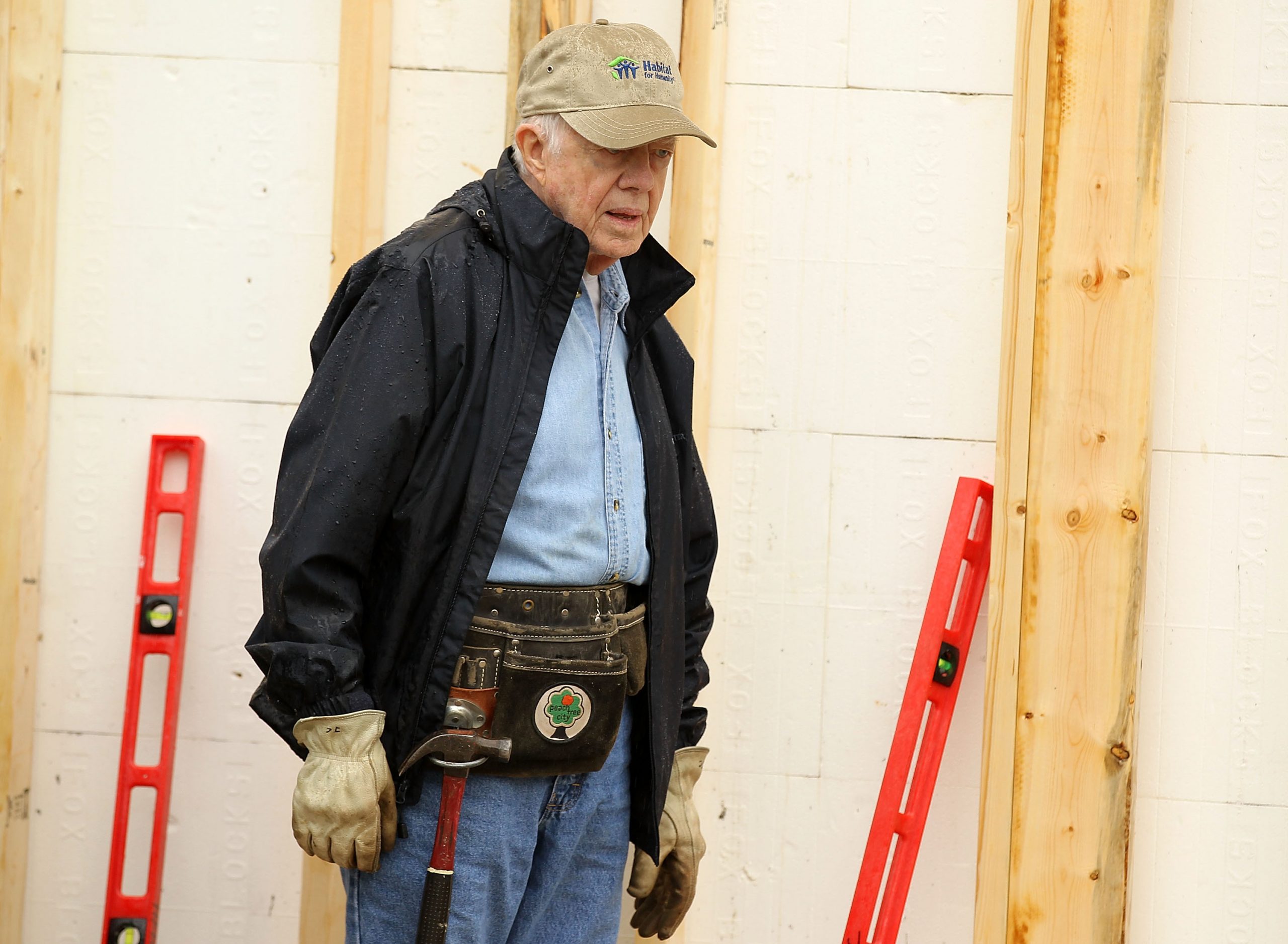Late-Stage Care May Involve Palliative or Hospice Care but They're Not the Same
- Former President Jimmy Carter, 98, has been under hospice care since February and remains in good spirits according to the latest update from his family. The former president alongside his wife Rosalynn, 95, recently celebrated their 77th wedding anniversary. The care he’s receiving is all about comfort.
- During palliative care, the patient is provided specialized medical care as they manage symptoms associated with their medical condition.
- The main difference between palliative care and hospice care is during hospice care no efforts are made to cure the illness while palliative care may also provide treatment "intended to cure" the illness.
- The former president is also a cancer survivor whose metastatic melanoma was previously treated with Keytruda a type of immunotherapy drug called a checkpoint inhibitor.
- Immunotherapy drugs have made a big impact on advancements in cancer treatment. They work by activating immune cells against cancerous cells by using the body's own ability to fight off the cells. Immunotherapy drugs are used for many different types of cancer including melanoma, bladder cancer, colorectal cancer, lung cancer, blood cancers, pancreatic cancer, and breast cancer, among others.
America's 39th President Jimmy Carter, 98, recently celebrated his 77th wedding anniversary under hospice care with his wife Rosalynn, 95, but the resilient former president remains in good spirits according to his family. When families make tough and emotional decisions about end-of-life care, it's all about comfort. Too often hospice and palliative care are thought to be the same, but that isn't necessarily the case.

Jimmy Carter is the longest-lived American president whose legacy became more adored in the five decades since he left the White House. He has been a longtime advocate for democracy, public health, and human rights and was awarded a Nobel Peace Prize. However, amid those accolades, Carter also successfully overcame health challenges that's help grant him the blessing of celebrating 77 years of marriage to the former first lady.
Read More
Melanoma starts in the same cells that give your skin, hair, and eyes their color. Only, in melanoma, the cells change in a way that makes them able to spread to other organs. While it's mostly found on areas of your skin exposed to the sun, it can also develop in areas that rarely receive sun rays. These areas may include the palms of your hands, soles of your feet, your eyes, inside your mouth, and under your nail.
"At the time, Carter thought he might have only weeks to live, but Winship doctors quickly developed a treatment plan for him, beginning with stereotactic radiation to control metastatic tumors in his brain, and a new immunotherapy drug that worked systemically," a statement from the Cancer Institute reads.
During a press conference before his first radiation treatment, the former president clarified that his melanoma had spread to his liver and his brain and that he would have four rounds of the immunotherapy drug pembrolizumab(brand name Keytruda) at three-week intervals.
Immunotherapy drugs work by activating immune cells against cancerous cells by using the body's own ability to fight off the cells. Immunotherapy drugs are used for many different types of cancer, including melanoma, bladder cancer, colorectal cancer, lung cancer, blood cancers, pancreatic cancer, and breast cancer, among others.
WATCH: Immunotherapy and checkpoint inhibitors.
Carter's drug Keytruda is a type of immunotherapy called a checkpoint inhibitor, which works by interfering with signaling pathways between T cells and cancer cells and prevents cancer cells from hiding from the body's T cells. More specifically, Keytruda works by essentially taking the brakes off the immune system to allow the body's T-cells to do what they are meant to do fight off invaders or abnormal cells like cancer cells, among other things.
"I’ve had melanoma patients early on who many years ago, wouldn’t have had a chance," Dr. Scott Strome explains to SurvivorNet.
Dr. Strome is the Chair of the Department of Otorhinolaryngology Head & Neck Surgery at the University of Maryland School of Medicine. He stresses the incredible impact and adds hope immunotherapy and checkpoint inhibitors have had on melanoma patients.

"[Melanoma patients who] come back to my clinic now, I can’t say cured of their disease, that’s probably the wrong term, but they’re alive and they don’t have really any evidence of disease that we can tell. That’s the greatest feeling that you can have as a doctor," Dr. Strome added.
The former president reportedly announced to his church in March 2016 that doctors stopped his treatment after seeing no more signs of tumors. Then, in 2019, Carter had surgery to relieve pressure on his brain caused by bleeding from his multiple falls at home.
Since February, President Carter has received hospice care meaning his doctors stopped medical intervention for any ongoing ailments. Carter's grandson Jason Carter said during an interview with the Associated Press in May, Jimmy and Rosalynn have been together at their home.
"Their faith is really grounding in this moment. In that way, it's as good as it can be," Jason Carter said.

The former president still follows the public discussion and receives updates on the humanitarian work the Carter Center is doing.
Hospice and Palliative Care
"Hospice care focuses on the care, comfort, and quality of life of a person with a serious illness who is approaching the end of life," the National Institute of Health (NIH) explains.
Hospice care provides comfort care, but it does not attempt to cure the illness. It's recommended families faced with potential hospice care talk to their care team early enough before pursuing hospice care to take advantage of all the comforts it provides.
"Starting hospice early may be able to provide months of meaningful care and quality time with loved ones," the NIH says.
During palliative care, the patient is provided specialized medical care as they manage symptoms associated with their medical condition. This form of care may also provide treatment "intended to cure" the illness as opposed to hospice care which does not.
WATCH: Palliative care improves your overall treatment by focusing on comfort.
"It's not the same thing as hospice. It's really important to recognize that palliative care, whether provided by your oncologist or by a specialty palliative care team, is an important adjunct to your oncologic care," Dr. Lisa Diver, a gynecologic oncologist and Medical Director at ImmunoGen tells SurvivorNet.
"It doesn't mean that your doctor is going to stop treatment or even wants to talk about that, but simply that he or she thinks it's important to support all aspects of your health. That could be pain control, [relief for] nausea or constipation, or mental health care. All of these other symptoms that commonly arise and are intertwined inextricably with your cancer care," Dr. Diver added.
Dr. Scott Rushing, a gynecologic oncologist and surgeon with Compass Oncology, expands on this by saying that palliative care is meant "to try and optimize a patient's quality of life."
"Quality of life is something that we've always got to keep at front stage and center," he previously told SurvivorNet. "Palliative care is a very important player in helping our patients have many good days."
Dr. Rushing continues by saying that palliative care can transition to hospice care "when we have reached a point where we don't have any therapy that we feel like is going to be effective."
More on Melanoma
- A Biopsy of Your Mole Doesn’t Mean You Have Melanoma
- A Melanoma Vaccine for Metastatic Patients
- Am I at High Risk for Melanoma?
- An Immunotherapy Success Story: Mary Elizabeth Williams Lived Through Metastatic Melanoma
- Be Aware of the Side Effects of Targeted Therapy for Melanoma
- Beating Aggressive Melanoma: An Immunotherapy Success Story
- Dramatic Improvement in Melanoma Survival Rates– The Treatment Revolution is Working
Research has been published showing the benefits of beginning palliative care early on in the course of treatmentsometimes as soon as the initial diagnosis.
In 2016, based on results from a total of nine randomized clinical trials, one quasi-experimental trial, and five secondary analyses, the American Society of Clinical Oncology (ASCO) issued a set of guidelines stating that "inpatients and outpatients with advanced cancer should receive dedicated palliative care services early in the disease course, concurrent with active treatment."
Some oncologists have adjusted how they talk about palliative care because of the common misconception about it compared to end-of-life hospice care.
WATCH: What is palliative care?
Dr. Ishwaria Subbiah, a medical oncologist and palliative care physician at the MD Anderson Cancer Center, shared a fascinating experiment from 2009 (published in 2011): rather than trying to eliminate the deeply ingrained end-of-life connotations of the term "palliative care," Dr. Subbiah's colleagues at MD Anderson decided to change the name altogether, rebranding their palliative care center as the "Supportive Care Clinic."
"We found out that the name was a big barrier to referrals," Dr. Subbiah said. "The name itself was a barrier to accessing our services."
Within a year of changing the name, MD Anderson's Supportive Care Clinic saw their referrals (that is, patients coming from their medical oncologists and tumor-directed cancer treatment to access their symptom management services) rise 41 percent. "And it has been consistently increasing in the double digits ever since," Dr. Subbiah said.
Carter's Legacy of Service
Jimmy Carter served as President of the United States from 1977 to 1981. His presidency faced several challenges domestically and abroad including an energy crisis and mounting issues in the Middle East. The Iranian hostage crisis influenced his defeat to President Ronald Reagan. During the crisis, Carter tried to secure the safe return of hostages.

"President Carter committed himself to the safe return of the hostages while protecting America's interest and prestige. He pursued a policy of restraint that put a higher value on the lives of the hostages than on American retaliatory power or protecting his own political future," the Jimmy Carter Library describes.
Before becoming the president, he was a peanut farmer, a preacher, a professor, a parole officer, and a naval officer.

While serving in the U.S. Navy, Carter worked aboard submarines. According to the Jimmy Carter Presidential Library, he served for more than 7 years and transferred to retired reserve with the rank of Lieutenant on Dec. 7, 1961.
Questions for Your Doctor
If you are in the middle of your cancer journey, or caring for a loved one who is asking questions about late-stage care can be helpful. To help you begin your conversation, consider the following questions.
- How will I know if I need palliative care to aid my cancer treatment?
- How does palliative care differ from the care I'm getting now?
- Who provides palliative care?
- Will my insurance cover palliative care?
- Is there a moment when palliative care becomes hospice care?
Learn more about SurvivorNet's rigorous medical review process.

